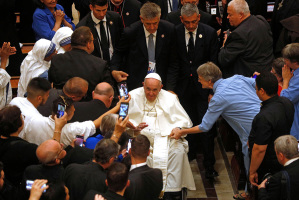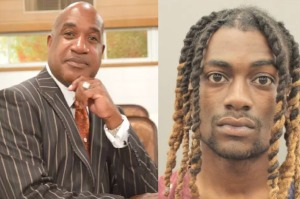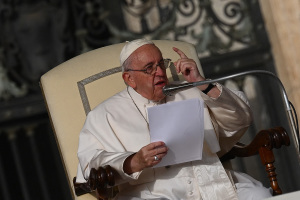Vaughn Walker's Sexuality Is Relevant, Asserts Attorney
Though retired judge Vaughn R. Walker’s confirmation that he is gay didn’t come as a surprise to many, some say he should have made the disclosure sooner.
Mathew Staver, president and founder of the conservative Liberty Counsel, which has defended marriage laws in California, argues that Walker’s homosexuality was relevant to the case of Proposition 8, the state’s amendment defining marriage, and he should have recused himself or at least disclosed his same-sex relationship.
Walker should have stepped down from the 2009 case, where he struck down the constitutionality of the voter-approved amendment defining marriage as a union between a man and a woman, Staver contends.
The attorney says his opinion is not based on the fact that Walker is gay, a revelation Walker made public for the first time last week, but because Walker was in a homosexual relationship and stood to gain from the ruling. He compares Walker’s involvement in the case to a businessperson steering a contract to a company that he/she has invested in.
“This is something he had a vested interest in,” Staver maintains.
The retired judge opened up about his sexuality during a meeting to announce plans for a private practice focused on conflict resolution. Two years earlier, The San Francisco Chronicle reported Walker’s homosexuality was an “open secret.” In an August 2009 article, news site Salon also published that Walker had been reportedly seen with his same-sex partner at profession or social events. Walker’s partner of 10 years is a physician, according to Reuters.
Walker told federal court reporters in the Wednesday meeting that he saw no reason to step down from the Prop. 8 case. “I don't think it's relevant. I never thought it was appropriate to recuse myself from that case," he said.
Walker defended his decision to preside over the case stating, "It would not be a positive development if you thought a judge's sexuality, ethnicity, national origin or gender would prevent a judge from handling a case.”
Kate Kendell, head of the National Center for Lesbian Rights, also defended Walker’s impartiality. After the Prop. 8 appeal she told the San Francisco Gate, “There is nothing about Walker as a judge to indicate that his sexual orientation, other than being an interesting factor, will in any way bias his view.”
The California Code of Judicial Ethics requires state judges to perform their judicial duties without bias or prejudice. Similarly, state lawyers are also required to demonstrate impartiality in their conduct and words.
Walker embodied this ethic as a business lawyer who represented the U.S. Olympic Committee in a bid to prevent a local gay group from calling itself the “Gay Olympics.” Reuters news reported that Walker also put a lien on the house of the group's founder who, at the time, was dying of AIDS.
As a result of that case, Kendell said, “There wasn't anyone who thought [overturning Prop. 8] was a cakewalk given his sexual orientation."
Staver still asserts that Walker’s long-term relationship casts a shadow of doubt over his ability to render an impartial judgment in the Prop. 8 case.
The U.S. Code, Section 455 (a) states, “Any justice, judge, or magistrate judge of the United States shall disqualify himself in any proceeding in which his impartiality might reasonably be questioned.” U.S.C. Section 455 (b) (1) also states that one of circumstances disqualifying a justice, judge or magistrate judge occurs when he/she "has a personal bias or prejudice concerning a party, or personal knowledge of disputed evidentiary facts concerning the proceeding.”
Last August, Walker ruled that the Prop. 8 marriage amendment was unconstitutional and determined that people of the same sex do have the right to marry. "Moral disapproval alone is an improper basis on which to deny rights to gay men and lesbians," the judge wrote in his 136-page opinion. "The evidence shows conclusively that Proposition 8 enacts, without reason, a private moral view that same-sex couples are inferior to opposite sex couples."
Walker’s ruling means he too could be lawfully married to his same-sex partner. Therefore, Walker’s long term-relationship may have caused him to have a biased opinion of the case, asserts Staver.
“I think he should have recused himself,” or the now retired judge should have at least disclosed his relationship to the court, Staver says.
At the time of the ruling, many conservatives took issue with Walker’s rational. Steve King (R-Iowa) responded, “This judge, Judge Walker, claims that he has arrived at a rational basis and I think it’s a completely irrational basis.”
Staver too criticized the opinion saying it read like the opinion of an advocate rather than a judge. “Now we know why,” he concludes.
Walker retired from the U.S. District Court of Northern California a few months after he gave his ruling. The George H. W. Bush appointee served as a federal judge for 21 years.
Since Walker’s decision on Prop. 8, traditional marriage proponents from ProtectMarriage.com have appealed the decision to the 9th Circuit Court of Appeals. The appeals court is currently awaiting a ruling from the California Supreme Court to decide whether Proposition 8 proponents have the legal right to defend the voter-approved ban on same-sex marriage in lieu of the governor and state's attorney general.
The state Supreme Court will likely decide the issue of standing by the end of this year.





























